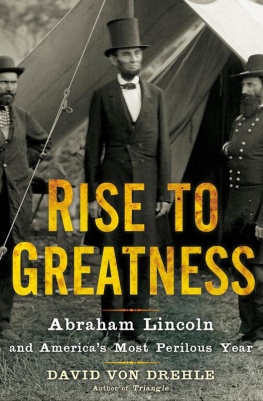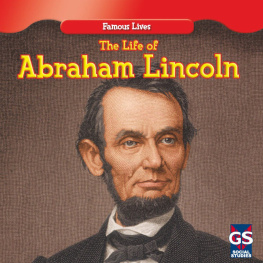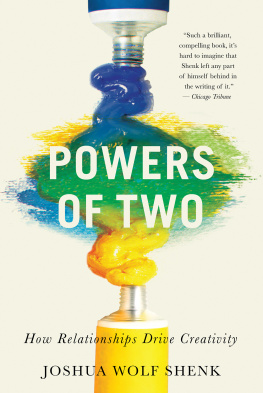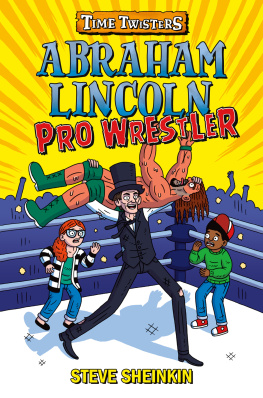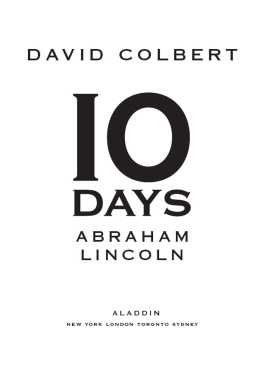
The author and publisher have provided this e-book to you for your personal use only. You may not make this e-book publicly available in any way. Copyright infringement is against the law. If you believe the copy of this e-book you are reading infringes on the authors copyright, please notify the publisher at: us.macmillanusa.com/piracy .
For Henry, Ella, Addie, and Clara:
Never doubt the power of courage and determination.
CONTENTS
1. 2. 3. 4. 5. 6. 7. 8. 9. 10. 11. 12. 13.
PROLOGUE
SO MUCH WAS ALL COMPRESSED
The year began with a day so warm and fine that only the calendar said January. There would be few pleasant moments in 1862, but New Years Day in Washington, D.C., was one of them. Everyone was out enjoying the sunshine that morningwomen in demure bonnets, men wishing they had left their overcoats at home, children dodging and shouting. The dusty streets of the half-built city were filled with people making their way toward the White House, where, by tradition, the president threw open the doors on the first day of each year.
Never had there been so large a crowd. The capital had doubled in size in the previous six months and was rapidly doubling again, as young men by the tens of thousands poured into Washington to join the Army of the Potomac. In April 1861, when war broke out between North and South, the entire U.S. Army numbered about 16,000 men, spread in little garrisons across the continent. By November, nearly five times that number, some 75,000 troops, could be mustered in a single field outside Washington for a presidential review. The ranking U.S. general planned to lead a column of more than a quarter of a million troops against the rebellious South.
Everywhere one looked in the capital, there were soldiers and more soldiers, brimming with zeal, eager for action, ignorant of war. They filled camps covering miles of hillsides in all directions. By day, the untested warriors marched and drilled, or cut logs and dug trenches to ring the capital with forts and firing pits. By night, some crowded into slapdash saloons and boardinghouse brothels. This instant army, like a great magnet, attracted regiments of merchants, job seekers, journalists, do-gooders, adventurers, spies, thieves, and would-be war contractors. A dull, swampy city was transformed in weeks into an overcrowded hive of patriotism, opportunism, and paranoia.
On the new years first morning, multitudes packed themselves into the blocks around the Executive Mansion, flowing down wooden sidewalks and dirt streets onto Pennsylvania Avenue, Washingtons only paved thoroughfare. There, the clip-clop of horseshoes and clanking of swords signaled the passage of freshly minted officers in full regalia: gold braid, white gloves, yellow sashes, obsidian boots. Carriage wheels rattled and friends called greetings, while somewhere in the distance, a Marine band blared martial music. Directly north of the White House, in the grand town houses around Lafayette Square, servants hurried to finish polishing the silver and laying out refreshments, for it was also tradition that the owners of these housescabinet members and sea captains and confidants of presidents past and presentwould open their own doors.
The New Years Day open house was a ritual of democracy in the spirit of Andrew Jackson, whose statue, atop a rearing horse, adorned the center of Lafayette Square. On this one day, everyone was welcome in the halls of power, from statesmen to workingmen, from consuls to clerks, from the Roman-nosed senator Orville Hickman Browning to the scoundrel who picked Brownings pocket. It was the greatest jam ever witnessed on any similar occasion, one newspaper correspondent observed. The people of Washington, it seemed, had somehow agreed for a few hours to forget their desperate situation and celebrate a new beginning.
Absent the holiday exuberance, however, a cool assessment of the countrys present circumstances would show that the American republic was in grave danger. The hope that secession fever would burn itself out was being trampled in the rush to battle stations. Strategies for reviving pro-Union sentiments in the South were stymied by the sheer size of the breakaway Confederate States of America, which covered an expanse larger than the entire European territory conquered by Napoleon. A pocket of loyalists in western Virginia had been liberated the previous summer by Union troops marching eastward from Ohio, but the pro-Union population of the more remote Appalachian Mountains, in eastern Tennessee and western North Carolina, was scarcely reachable down long dirt roads through hostile territory. Elsewhere in Dixie, what Union sentiment survived was scattered and cowed. The Confederacy was in the process of mobilizing a greater percentage of its population as soldiers than any European power had ever achieved. Those troops were led by some of the most experienced military men on the North American continent, starting with Confederate president Jefferson Davis, a West Point graduate, combat veteran, and former U.S. secretary of war.
The Confederacy also wielded a powerful economic weapon: near total control of the global cotton supply, at a time when textiles were driving the industrial revolution and cotton was perhaps the worlds most important commodity. The cotton embargo enforced by rebel leaders was a gun to the heads of the British and French governments, putting tremendous pressure on them to support Southern independence. Pressure aside, the idea that the Confederacynow a powerful country in its own rightcould be tamed and forced back into the Union by an army of raw volunteers, led by an unschooled frontier lawyer as commander in chief, struck most European observers as far-fetched, even preposterous. It is in the highest Degree likely that the North will not be able to subdue the South, the British prime minister, Lord Palmerston, counseled his Foreign Office.
Such skepticism was reinforced by conditions on the ground. Rebel soldiers menaced Washington from nearby Manassas, Virginia, where they had routed a Union army a few months earlier. Jefferson Davis was weighing a campaign into Maryland to stir up secessionists and cut off the capital from the North. Confederate artillery commanded the Potomac River above and below the capital, effectively sealing the waterway. No one in civilian authority had any detailed knowledge of the plans being prepared by the Unions top general, George B. McClellan; worse, McClellan was ill and rumored to be dying.
The federal government, meanwhile, appeared overwhelmed. The president was increasingly seen as feckless and inadequate. Congress was in the hands of a political party that had never governed before. The Treasury Department was broke, yet federal spending was multiplying as never before; in 1862, the government would spend six times as much as in 1861. (Northern banks, fearing a panic by demoralized investors, had closed their exchange windows, refusing to redeem paper money with gold or silver.) The War Department was a corrupt shambles, its chief on the verge of being fired. Despairing State Department envoys to Britain and France believed that the great powers were aligned against their besieged government; it appeared to be only a matter of time before Europe would intervene to settle the conflict in favor of the Confederacy. A rebel diplomat crowed from London, At present there is a probability that our recognition by her Britannic Majestys Government will not be much longer delayed. President Davis considered European intervention almost inevitable, and he shaped his strategies around that confidence.
To the east of the White House, at the far end of that lone paved avenue, stood the unfinished U.S. Capitol, darkly crowned by the cast-iron skeleton of an enormous dome. To the south of the mansion, across a fetid bog, rose the sad stump of the Washington Monument, abandoned for lack of funds. These uncompleted projects were silent reminders that great things had been planned in this city, and large dreams dreamt. The boldest of all the American dreams was the vision of a great new nation that would span the continent, dominate the hemisphere, and rival any country on earth. This dream of one nation indivisible, from sea to shining sea, was the true prize at stake in the terrible months ahead.
Next page
